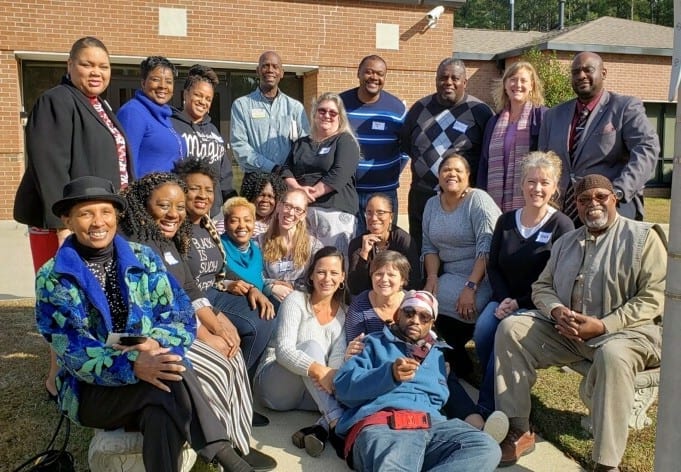
Resources for Resilience™ (RFR) doesn’t just offer a one-time train-the-trainer experience and then expect new partners to be fully prepared to lead our two-day Reconnect for Resilience™ (Reconnect) trainings; instead, we offer a six-month Resilience Educator Apprenticeship Program (REAP) that allows emerging trainers to observe, practice, reflect, and build comfort and capacity as a leader in this work over time. Brain science and resiliency-focused learning point us in this direction. Community is built and stress minimized during the process of becoming skilled at teaching Reconnect tools in this way.
In November 2019, Mary Lynn Barrett and I co-led the four-day initial learning experience for 18 REAP participants in eastern NC. These individuals live and work in Wilson, Nash, and Edgecombe counties and were selected to become Reconnect trainers through an intentional applicant selection process through the Rural Opportunity Institute, an partner organization that is doing incredible work around resilience education and community healing in eastern NC.
Practicing Reconnect tools together, these emerging trainers went deep and wide, learning lots, taking risks, and forming bonds as neighbors and trusted colleagues. Among them were pastors, parents, nonprofit leaders and behavioral health providers, public educators and administrators, an early intervention supervisor, community organizers and board members, small business owners, an elected official, and a Muslim leader and mentor.
Between us, we carry experiences of incarceration, of chronic pain, and of times of scarcity. Some of us carry stories of our own recovery or the weight of loved ones who aren’t yet in recovery. Among us, there are many ACEs, and all of us carry the burdens—visible and invisible– of various losses, of structural racism, and of historical trauma—absorbed and held, literally, in our bodies. Being able to name these things without feeling judged created incredible common ground and safe space. We talked openly about race, gender, class, faith and the many wounds experienced and related to them. Learning (and we were learning tons about the brain, attachment, the automatic nervous system, trauma, neuroplasticity, and shame resilience) can only happen when people feel safe.
As we used Reconnect tools with one another, we began to hear about each other’s vast strengths, courage, and resilience. Naming and detailing resources buoyed and bonded us. This is a biological model, so we could see and feel our bodies – bodies made for wellness – releasing long-carried trapped energy and our nervous systems resetting toward balance. We were individually accessing our own medicine and we were collectively experiencing the power of connection. We heard about one another’s greatest joys, comforts, values, and successes. We danced, sang, laughed, and cried. There were fidget spinners, colored pencils, fresh sunflowers, cutting-edge books, sock feet, fresh grapes, and plenty of home-made, local peanut butter brittle. The space was infused with music (songs anyone and everyone selected), and we sang Happy Birthday by phone to one person’s dad.
The Area L AHEC training room and library became the container for some of the most potent public health education happening in NC right now. And amidst what may sound like a lot of fun and play, the 20 of us worked incredibly hard – stretching intellectually, cognitively, physically, socially, interpersonally, and spiritually. Inch-thick REAP binders got thicker as folks took notes, created reminders to themselves, and broke down complex concepts into language that’ll be clear and comfortable to future learners (kids and adults alike) regardless of their reading level or background. And the vast majority of our work was experiential – practicing seven tools, teaching them to one another, presenting in small group, experiencing “ah ha” moments, and connecting our own dots.
Comments shared among us included:
“This is a generational teaching to heal a generational burden.”
“I’m not crazy; my body just does what all bodies do that have experienced trauma. And now I can get rebalanced when I need to, especially if my people know these tools, too, so I don’t have to do it alone.”
“Scaring and shaming each other isn’t working and we see it all around us – no wonder kids struggle to pay attention, to make ‘good choices’ and to learn, no wonder adults do, too. Changes in parenting and education will be part of the solution.”
And, finally, one emerging Reconnect trainer summed it up like this: “This is liberation work – from the inside out. To change systems and prevent trauma, first we gotta heal parts of ourselves.”
